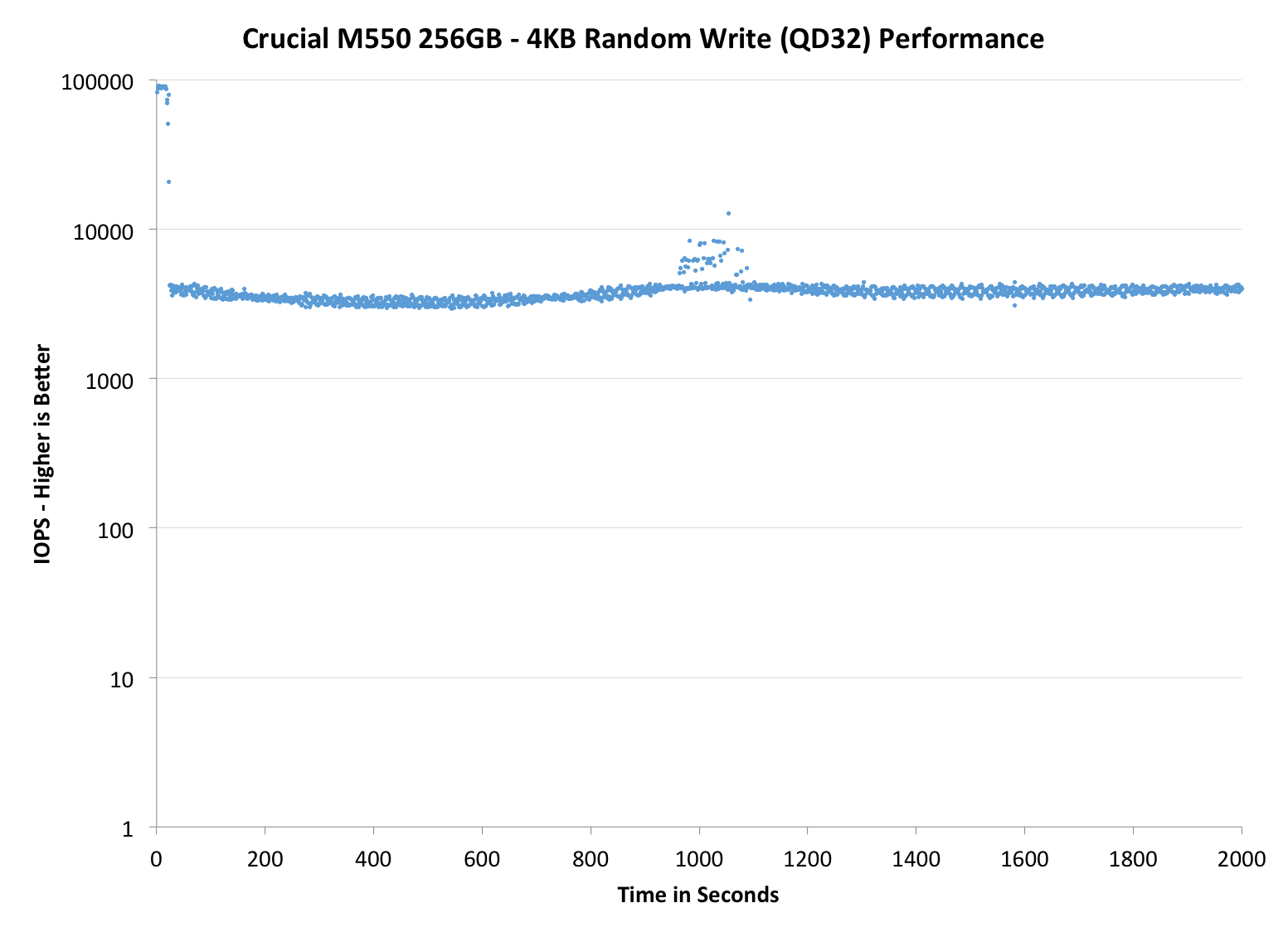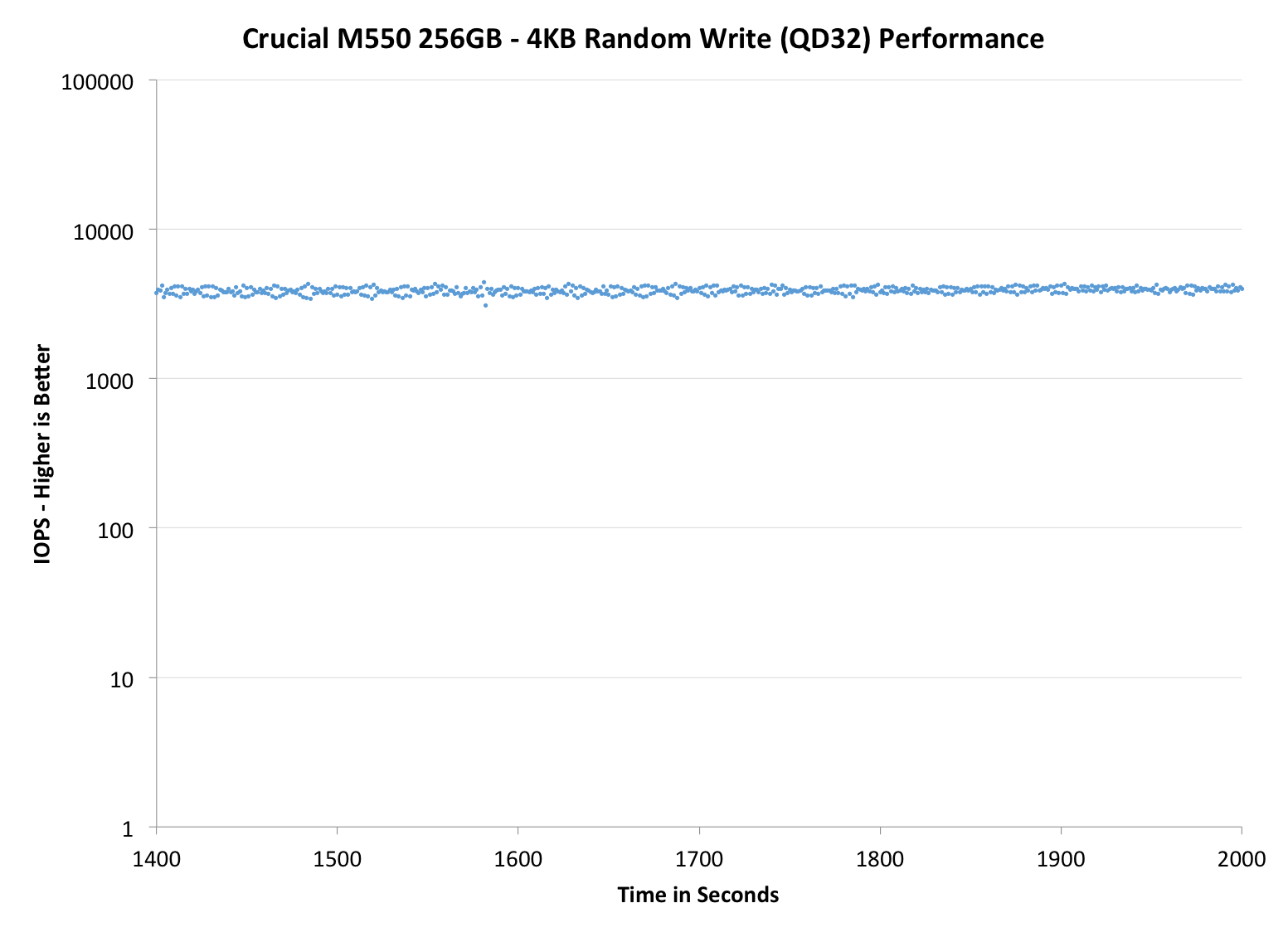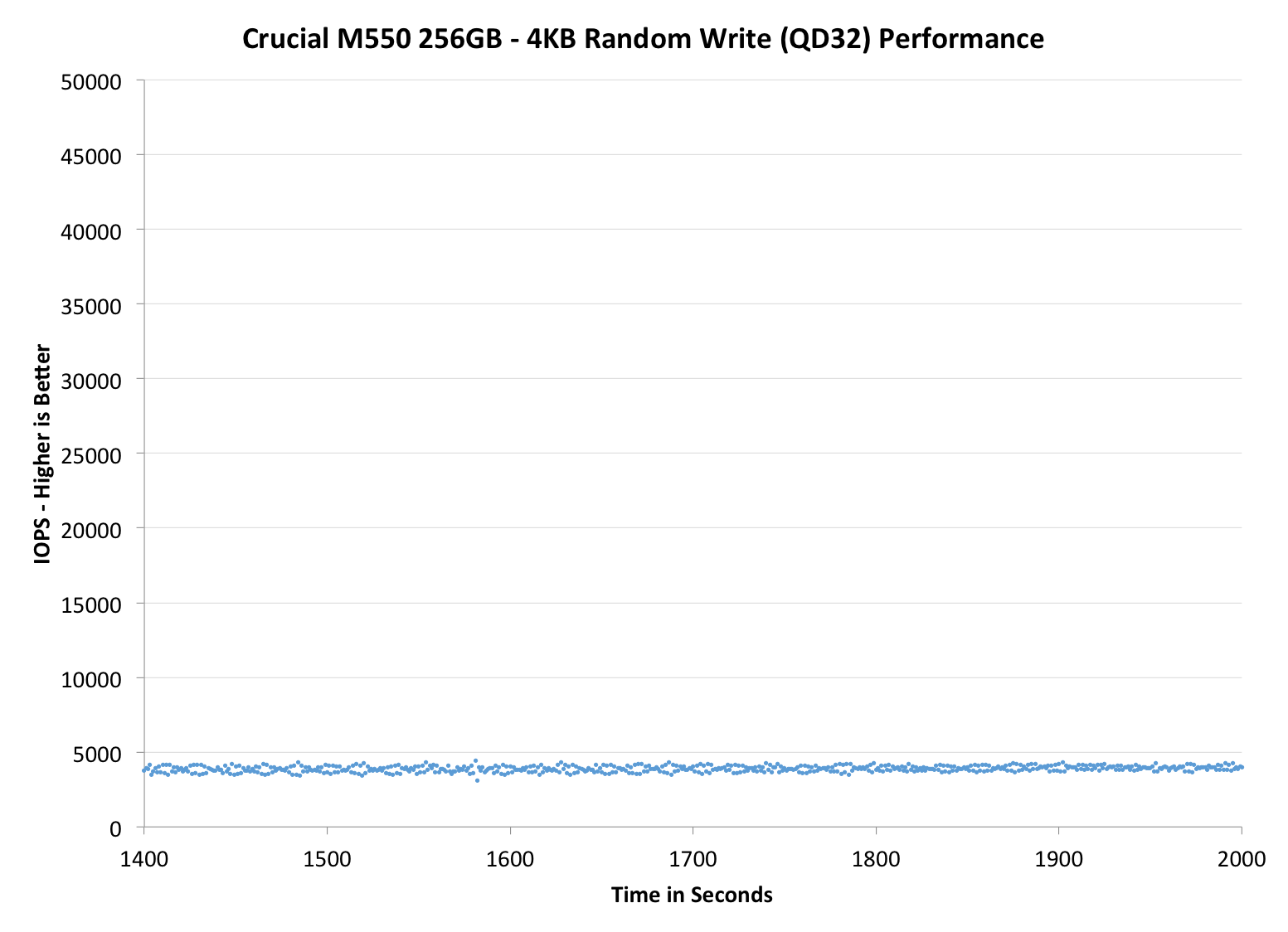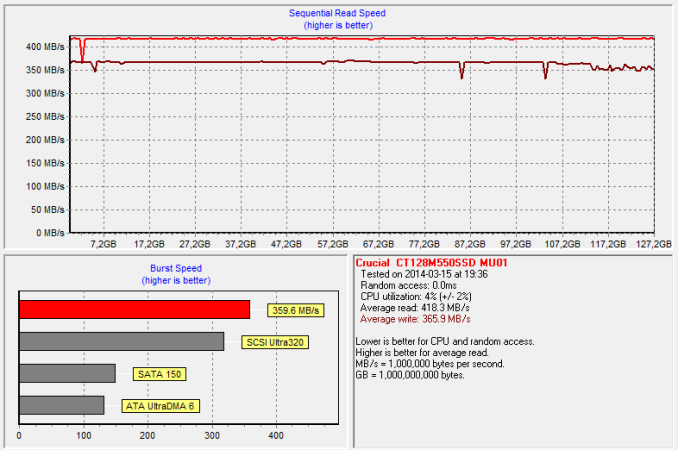Crucial M550 Review: 128GB, 256GB, 512GB and 1TB Models Tested
by Kristian Vättö on March 18, 2014 8:00 AM ESTPerformance Consistency
Performance consistency tells us a lot about the architecture of these SSDs and how they handle internal defragmentation. The reason we don’t have consistent IO latency with SSD is because inevitably all controllers have to do some amount of defragmentation or garbage collection in order to continue operating at high speeds. When and how an SSD decides to run its defrag or cleanup routines directly impacts the user experience as inconsistent performance results in application slowdowns.
To test IO consistency, we fill a secure erased SSD with sequential data to ensure that all user accessible LBAs have data associated with them. Next we kick off a 4KB random write workload across all LBAs at a queue depth of 32 using incompressible data. The test is run for just over half an hour and we record instantaneous IOPS every second.
We are also testing drives with added over-provisioning by limiting the LBA range. This gives us a look into the drive’s behavior with varying levels of empty space, which is frankly a more realistic approach for client workloads.
Each of the three graphs has its own purpose. The first one is of the whole duration of the test in log scale. The second and third one zoom into the beginning of steady-state operation (t=1400s) but on different scales: the second one uses log scale for easy comparison whereas the third one uses linear scale for better visualization of differences between drives. Click the buttons below each graph to switch the source data.
For more detailed description of the test and why performance consistency matters, read our original Intel SSD DC S3700 article.
 |
|||||||||
| Crucial M550 | Crucial M500 | Intel SSD 730 | SanDisk Extreme II | Samsung SSD 840 EVO | |||||
| Default | |||||||||
| 25% Spare Area | - | ||||||||
I can't say I'm very pleased with the IO consistency of the M550. There is a moderate increase (~4K IOPS vs 2.5K in M500) in steady-state performance but other than that there isn't much good to say. All the other higher-end drives run circles around the M550. I should note that the M550 does have considerably less over-provisioning than the other drives but even at 25% OP the results aren't pretty. There is huge variation in performance and the graphs with additional spare area certainly look quite abnormal, but the IOPS is still mostly below 5000. There are peaks of over 50K IOPS too but personally I would prefer a steady line (like the SSD 730) instead of this constant up and down. In client workloads the variation in IOPS isn't as critical as in the enterprise (where predictable performance is a must) but there can be an impact on performance in IO intensive scenarios.
 |
|||||||||
| Crucial M550 | Crucial M500 | Intel SSD 730 | SanDisk Extreme II | Samsung SSD 840 EVO | |||||
| Default | |||||||||
| 25% Spare Area | - | ||||||||
 |
|||||||||
| Crucial M550 | Crucial M500 | Intel SSD 730 | SanDisk Extreme II | Samsung SSD 840 EVO | |||||
| Default | |||||||||
| 25% Spare Area | - | ||||||||
TRIM Validation
To test TRIM, I took a secure erased drive and filled it with sequential data. Then I tortured the drive with 4KB random writes (QD32) for 30 minutes followed by a TRIM command (quick format in Windows). Finally I measured performance with HD Tach to bring you the graph below:
And as you should expect, TRIM works.











100 Comments
View All Comments
tech6 - Tuesday, March 18, 2014 - link
I don't think that the M550 is so much a "performance" variant as it is a direct replacement for the 500. Most likely what is happening here is that the benchmark for value SSDs has just been lifted slightly. Once the M500 disappears the 550 will assume its price point.Kristian Vättö - Tuesday, March 18, 2014 - link
The thing is, the M550 doesn't replace the M500. The M500 will continue to be available and the M550 is simply Crucial's "high-end" offering.ZeDestructor - Tuesday, March 18, 2014 - link
Interesting... Much like tech6, I was expecting the M500 to die off peacefully... Any details from micron on why they're doing that?For now, I should go and buy an M500 480GB already... They're really cheap...
Kristian Vättö - Tuesday, March 18, 2014 - link
There are still some cost savings from the 128Gbit NAND at the smaller capacities and it's possible that the controller/DRAM configurations are slightly cheaper as well. Could be that Crucial/Micron is also using slightly lower quality NAND for the M500 since the extra space reserved for RAIN makes sure that is not an issue.hojnikb - Tuesday, March 18, 2014 - link
Its interesting, that they are not using more dies per package (as opposed to samsung with evos).I'm guessing using less packages and possibly smaller pcb could yield additional cost savings for crucial/micron... Or is this not the case...? Also they could go with dramless like toshiba is doing with their q series ?
V500 anyone ?
hojnikb - Tuesday, March 18, 2014 - link
So basicly m500 is crucials/microns "low" end offering now.Just like the crappy v4 (that drive is really slow and im ashamed to own one) that was in the m4 days.
tim851 - Tuesday, March 18, 2014 - link
I hope so. I find the speed of SSDs to be sufficient for now and I'd like to see them work on pricing rather than performance.hojnikb - Tuesday, March 18, 2014 - link
Yeah i hope so too. I'm planning to buy 480GB/1TB version sometime this year to replace that sandforce joke i'm having now (intel's 330) and ditch HDDs alltogether.StevoLincolnite - Wednesday, March 19, 2014 - link
I'm running a several year old OCZ Vertex 2 64Gb SSD... Been solid.One thing I have never said however was: "Gee this SSD is slow!". - Mostly the main advantage SSD's brought to the arena was the stupidly low latencies compared to mechanical drives.
Price needs to still come down, capacities need to keep increasing in the low-end and mid-range segments.
Literally the single *biggest* upgrade that a majority of PC's could use is simply an SSD, regardless of it's transfer rates.
Even on ancient 6-7 year old Core 2 PC's...
trichome333 - Wednesday, March 19, 2014 - link
I agree mate. Just got a M500 240gb and I literally feel like a dunce for not moving earlier.